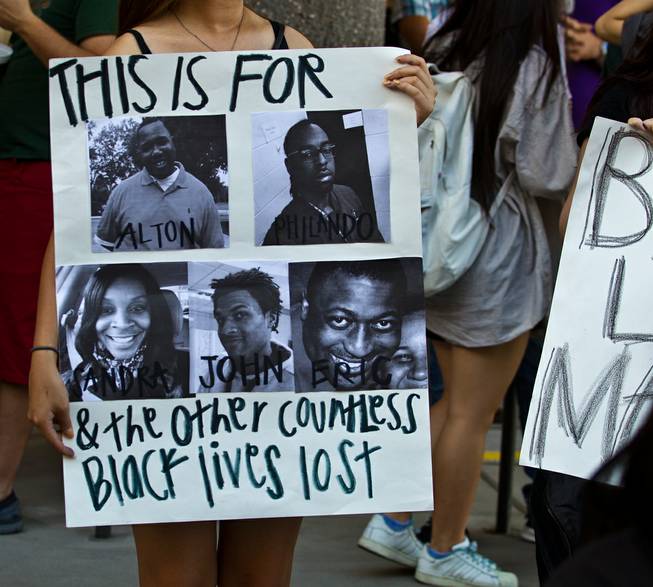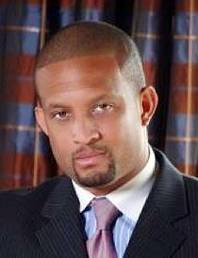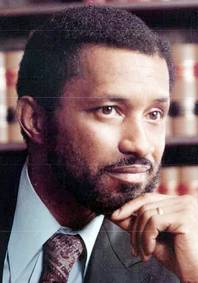
One of the many signs displayed as the Black Lives Matter organization holds another protest and march in downtown Las Vegas on Saturday, July 16, 2016.
Monday, July 25, 2016 | 2 a.m.

Marwan Porter

James Porter
Attorney Marwan Porter represents clients in wrongful-death lawsuits tied to events dominating headlines throughout the country.
A graduate of Bishop Gorman High School, Porter is the son of Las Vegas attorney James Porter, a National Bar Association Hall of Fame inductee, co-founder of the valley’s Urban Chamber of Commerce and one of the first black attorneys to practice in the city.
Now running his own law firm in Stuart, Fla., after graduating from Howard University’s School of Law and working for seven years under famed civil rights attorney Willie Gary, Marwan Porter has represented clients in Ferguson, Mo., and more recently in Orlando, in addition to nearby Miami and his hometown of Las Vegas.
He native credits his success and ongoing drive to his late father, who died this year.
“He taught me to be a social engineer, to use law as a tool and a weapon to effectuate change for everybody,” Porter said. “You want to be a part of something that remains.”
With as many as 100 wrongful death lawsuits filed through his firm each year, Porter says a lot of cases involve police shootings, particularly of black men.
“We see these coming to light in recent years, and we want to be there to put the gloves on and fight when called upon,” Porter said.
Porter said events such as this month’s police shootings of black men in Baton Rouge, La., and St. Anthony, Minn., have been happening “for decades.” But thanks to video-recording technology and platforms such as Periscope and Facebook Live, Porter said Americans were becoming more aware, opening the doors for social change.
“Imagine what would have been the story in Louisiana or Minnesota if those cases wouldn’t have been caught on camera,” Porter said. “It would have been a completely different narrative and it would have been very unlikely that either of those families would have gotten any justice.”
Porter pointed to one of his own cases, representing the family of Raymond Herisse, a 22-year-old black man who died after police fired 116 bullets at his Hyundai Sonata in 2011 on Miami Beach. Sixteen bullets struck Herisse, and four bystanders were wounded. Though all officers were cleared in the shooting in 2014, Porter helped Herisse’s family secure a settlement this year from the Miami Beach and Hialeah police departments.
He said his father often represented black clients. While it was more difficult to contest racial profiling during James Porter’s heyday in the court system from the 1960s to the early 2000s, he taught his son that lawyers of every color could instigate reform.
“Our society is based on laws,” Marwan Porter said. “If you know the laws and know how to work within the laws, you have the ability to change them and make new ones.”
Today, Porter advocates for an overhaul in police policies and procedures to combat “fear and stereotyping.”
“We need to have better checks and balances,” he said. “Taking a life should be used as a last resort for police. But when dealing with the African-American community, it seems like it’s all too often used as the first resort.”
Porter said he began learning the values of race equality at a young age. Even before Marwan Porter was born, his father served in Washington, D.C., investigating the cause of the 1967 race riots and providing recommendations to President Lyndon B. Johnson’s administration on how to prevent further strife. James Porter also taught Marwan to value human life, he said, fighting to reverse the death penalty imposed on a Nevada inmate in the 1980s and spearheading Las Vegas’ Uniform Reciprocal Enforcement of Support division, which helped ensure child support payments reached the children for whom they were intended.
“Just the effect he was able to have on the community, using law as a tool and as a weapon, was inspiring,” Porter said.
While Porter’s firm also takes clients from business litigation, personal-injury and both labor and employment cases, he estimated more than half of his roughly 200 cases each year came from wrongful deaths, including police and mass shootings and car crashes. He says although his firm occasionally has to deny clients, he aims for higher-profile, complex cases, so he can make the greatest social impact.
It’s a path his father has walked, and Porter is proud to be on it.
“A lot of people, black and white, don’t have positive male father figures. And it was something I was fortunate to have and emulate.”

Join the Discussion:
Check this out for a full explanation of our conversion to the LiveFyre commenting system and instructions on how to sign up for an account.
Full comments policy